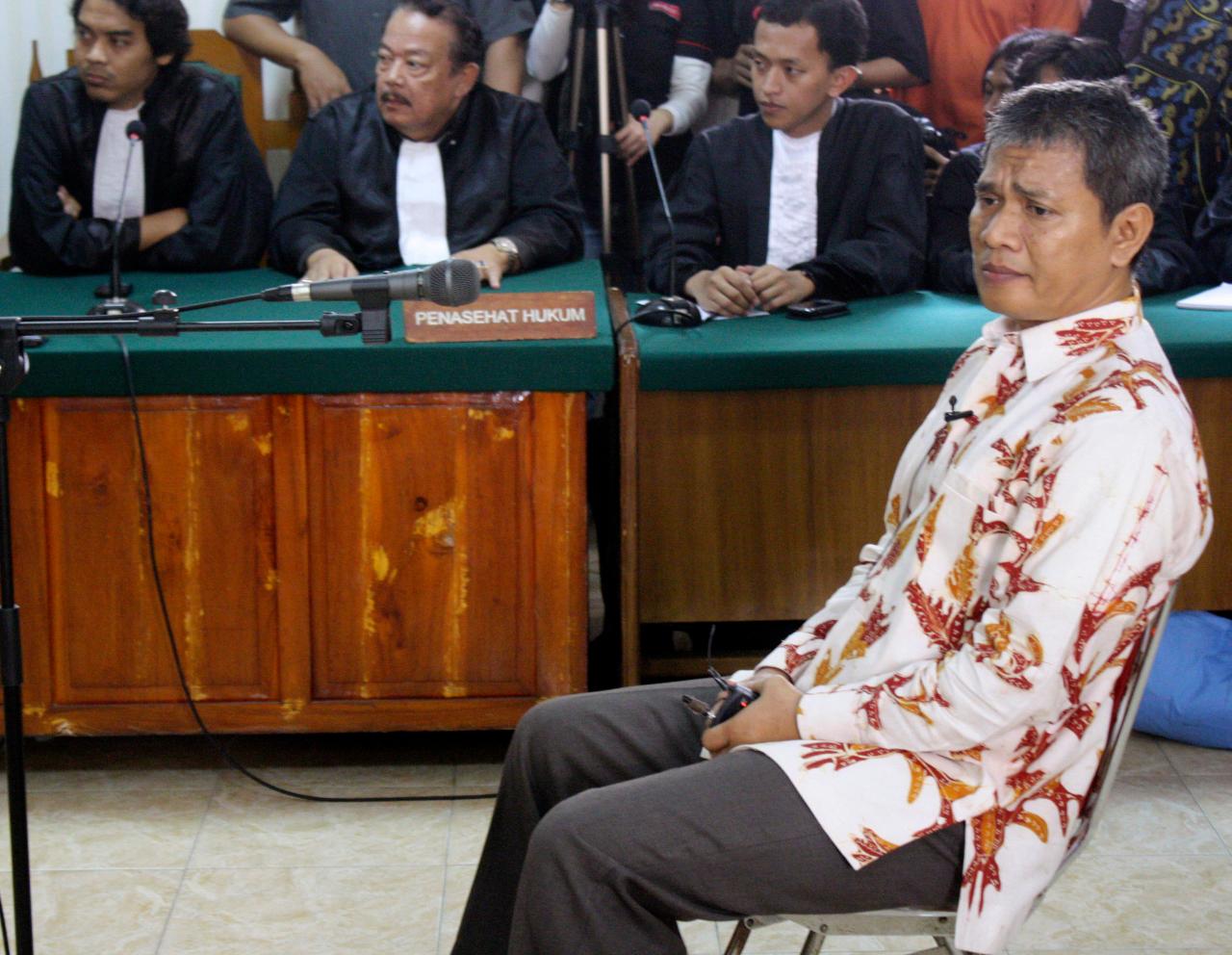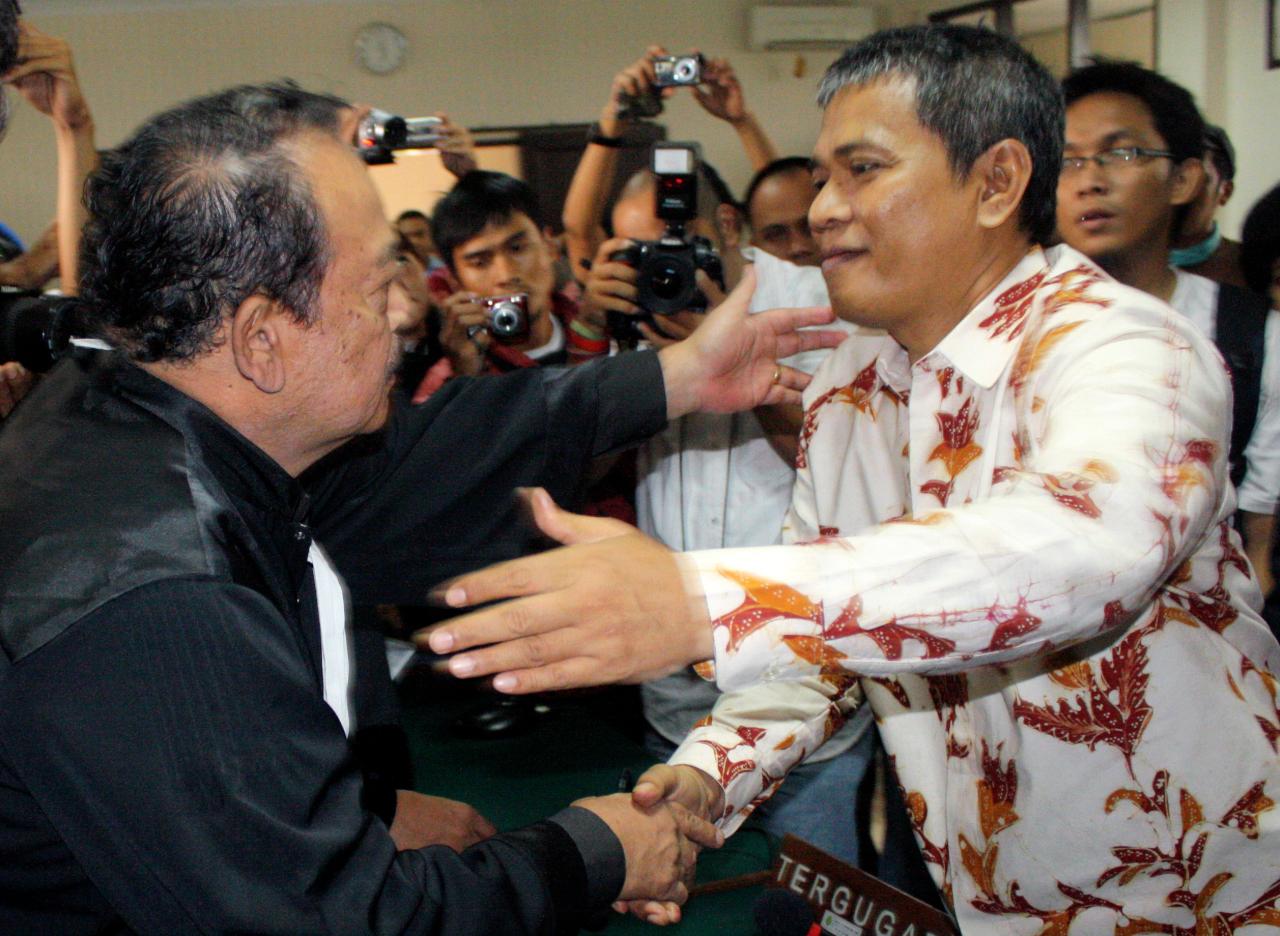| August 15, 2011 |
Victim of Indonesian mob attack sent to jail
By ALI KOTARUMALOS, Associated Press

Member of Ahmadiyah sect Deden Sudjana, sits on the defendant’s chair during his trial at a district court in Serang, Banten, Indonesia, Monday, Aug. 15, 2011. The man injured when Muslim hard-liners attacked members of his minority Islamic sect was sentenced Monday to six months in jail, more than some of the actual attackers. (AP Photo)
JAKARTA, Indonesia (AP) — An Indonesian man wounded when Islamic hard-liners launched a deadly attack on his minority sect was sentenced Monday to six months in prison — more than some of those caught on video taking part in the lynching.
Human rights groups blasted the ruling, saying 48-year-old Deden Sudjana was acting in self-defense. They said it showed how the police, the judicial system and the government are helping fuel religious intolerance in the world’s most populous Muslim nation.
Sudjana was convicted of inciting violence because he defied police orders to leave the scene when the attackers arrived at a meeting of the minority Ahmadiyah sect. Sudjana instead fought back during the Feb. 6 incident in the village of Cikeusik in central Indonesia.
 Footage of the attack, which circulated widely on the Internet, showed 1,500 hard-liners descending on a house where 20 members of the sect had gathered. The attackers, carrying wooden clubs, machetes and rocks, killed three people and continued to pummel their lifeless bodies, chanting “God is Great!“ as police looked on.
Footage of the attack, which circulated widely on the Internet, showed 1,500 hard-liners descending on a house where 20 members of the sect had gathered. The attackers, carrying wooden clubs, machetes and rocks, killed three people and continued to pummel their lifeless bodies, chanting “God is Great!“ as police looked on.
Sumartono, presiding judge of the Serang District Court, gave Sudjana six months for resisting police orders and then beating one of the mob’s leaders.
Sudjana — whose hand was nearly severed by a machete during the attack — looked stunned as the verdict was read out.
“I’m the victim,” he told reporters as he was escorted from the courtroom. “Why am I getting a higher sentence than some of the perpetrators?“
Indonesia, a predominantly Muslim and secular nation of 240 million, has a long history of religious tolerance.
But a small, extremist fringe has grown more vocal and violent in recent years. They’ve been emboldened by the inaction of President Susilo Bambang Yudhoyono, who relies on the support of Islamic parties in Parliament, and does not want to offend conservative Muslims by taking sides.
Perpetrators of such violence often go unpunished.
 Human rights groups say police, under pressure by hard-liners, did not carry out a proper investigation into the Feb. 6 attacks and that prosecutors, claiming the Ahmadis were instigators, didn’t call key eyewitnesses.
Human rights groups say police, under pressure by hard-liners, did not carry out a proper investigation into the Feb. 6 attacks and that prosecutors, claiming the Ahmadis were instigators, didn’t call key eyewitnesses.
Andreas Harsono, of the New York-based Human Rights Watch, called it the Talibanization of Indonesia.
“We have the impression that the Indonesian justice system has surrendered to (those) who have decided to take the law into their own hands,” he said.
The decision to punish one of the victims will only encourage more such violence, he added.
So far, 12 members of the mob have been convicted, including one man who was captured on camera smashing in an Ahmadi member’s skull with a rock.
They were given between three to six months in jail.
The Ahmadiyah, which has followers around the world, is considered heretical by many Muslims and banned in many Islamic countries because of its belief that Muhammad was not the final prophet.
In recent years, hard-liners in Indonesia have attacked the sect’s mosques and intimidated some of its 200,000 followers, but the lynching in Cikeusik was by far the most brutal.
The latest attack occurred over the weekend in the South Sulawesi town of Makassar, where 30 members of the hardline Islamic Defenders Front attacked a mosque.
Two people also were beaten, sect members and a lawyer who tried to interfere, rights groups said.
Human rights groups blasted the ruling, saying 48-year-old Deden Sudjana was acting in self-defense. They said it showed how the police, the judicial system and the government are helping fuel religious intolerance in the world’s most populous Muslim nation.
Sudjana was convicted of inciting violence because he defied police orders to leave the scene when the attackers arrived at a meeting of the minority Ahmadiyah sect. Sudjana instead fought back during the Feb. 6 incident in the village of Cikeusik in central Indonesia.

Member of Ahmadiyah sect Deden Sudjana, right, is greeted by his lawyer Nurcholis Hidayat, after the judge delivered his verdict during his trial at a district court in Serang, Banten, Indonesia, Monday, Aug. 15, 2011. The man injured when Muslim hard-liners attacked members of his minority Islamic sect was sentenced Monday to six months in jail, more than some of the actual attackers. (AP Photo)
Sumartono, presiding judge of the Serang District Court, gave Sudjana six months for resisting police orders and then beating one of the mob’s leaders.
Sudjana — whose hand was nearly severed by a machete during the attack — looked stunned as the verdict was read out.
“I’m the victim,” he told reporters as he was escorted from the courtroom. “Why am I getting a higher sentence than some of the perpetrators?“
Indonesia, a predominantly Muslim and secular nation of 240 million, has a long history of religious tolerance.
But a small, extremist fringe has grown more vocal and violent in recent years. They’ve been emboldened by the inaction of President Susilo Bambang Yudhoyono, who relies on the support of Islamic parties in Parliament, and does not want to offend conservative Muslims by taking sides.
Perpetrators of such violence often go unpunished.

Member of Ahmadiyah sect Deden Sudjana, center, speaks to the press after his trial at a district court in Serang, Banten, Indonesia, Monday, Aug. 15, 2011. The man injured when Muslim hard-liners attacked members of his minority Islamic sect was sentenced Monday to six months in jail, more than some of the actual attackers. (AP Photo)
Andreas Harsono, of the New York-based Human Rights Watch, called it the Talibanization of Indonesia.
“We have the impression that the Indonesian justice system has surrendered to (those) who have decided to take the law into their own hands,” he said.
The decision to punish one of the victims will only encourage more such violence, he added.
So far, 12 members of the mob have been convicted, including one man who was captured on camera smashing in an Ahmadi member’s skull with a rock.
They were given between three to six months in jail.
The Ahmadiyah, which has followers around the world, is considered heretical by many Muslims and banned in many Islamic countries because of its belief that Muhammad was not the final prophet.
In recent years, hard-liners in Indonesia have attacked the sect’s mosques and intimidated some of its 200,000 followers, but the lynching in Cikeusik was by far the most brutal.
The latest attack occurred over the weekend in the South Sulawesi town of Makassar, where 30 members of the hardline Islamic Defenders Front attacked a mosque.
Two people also were beaten, sect members and a lawyer who tried to interfere, rights groups said.
Associated Press writers Niniek Karmini and Michael Holtz contributed to this report from Jakarta.
Copyright © 2011 The Associated Press. All rights reserved
URL: www.google.com/hostednews/ap/article/ALeqM5ihZBh...
URL: www.google.com/hostednews/ap/article/ALeqM5ihZBh...




